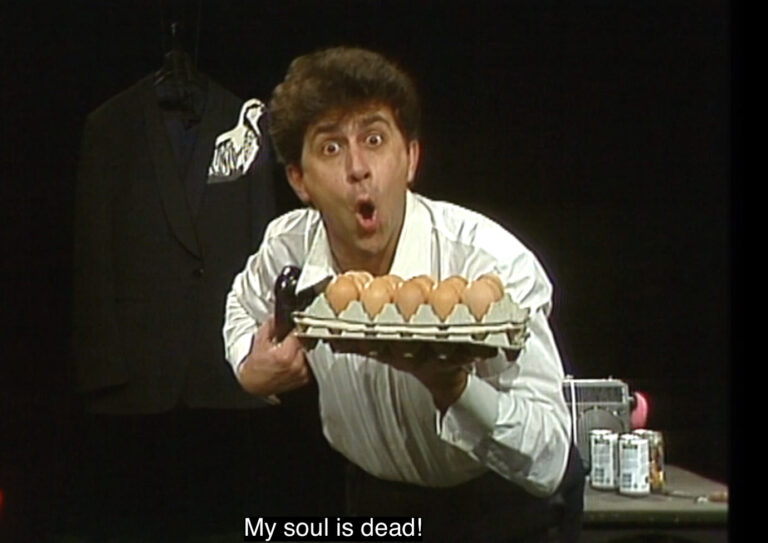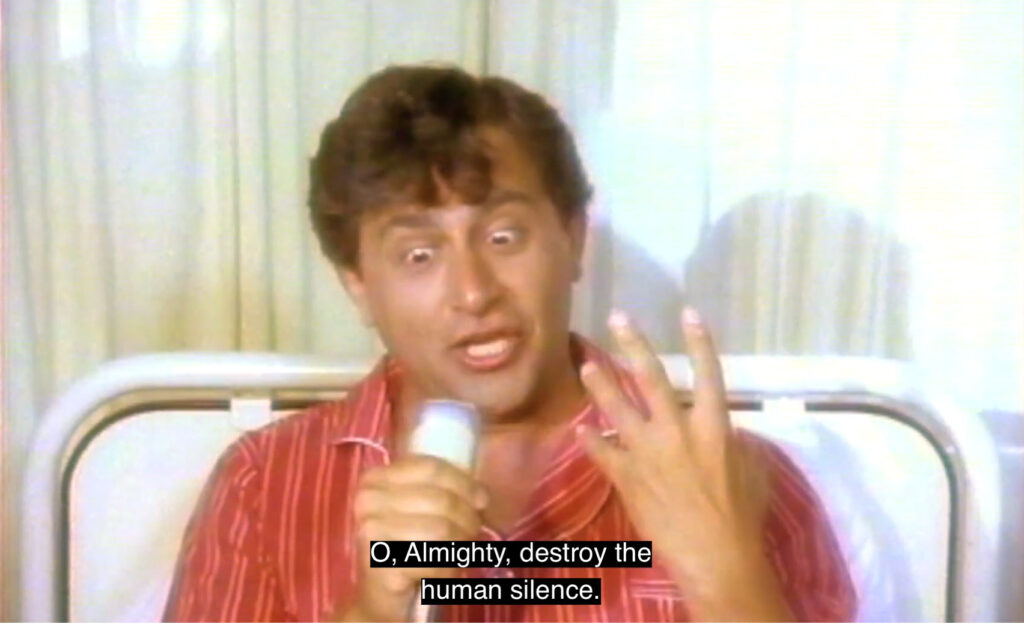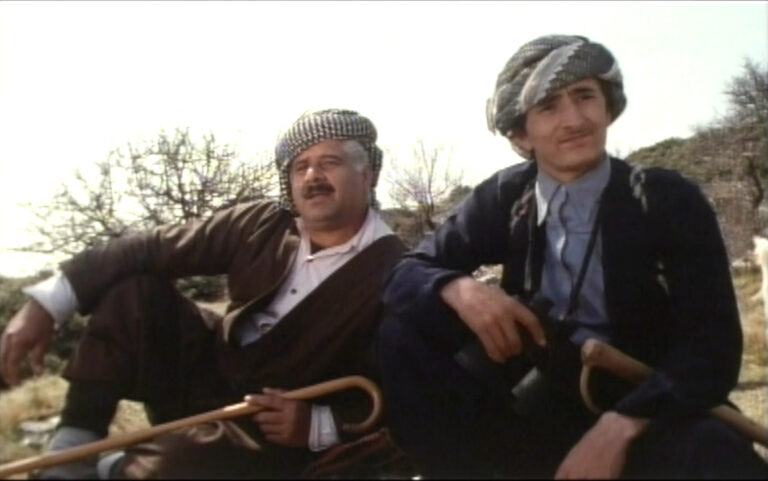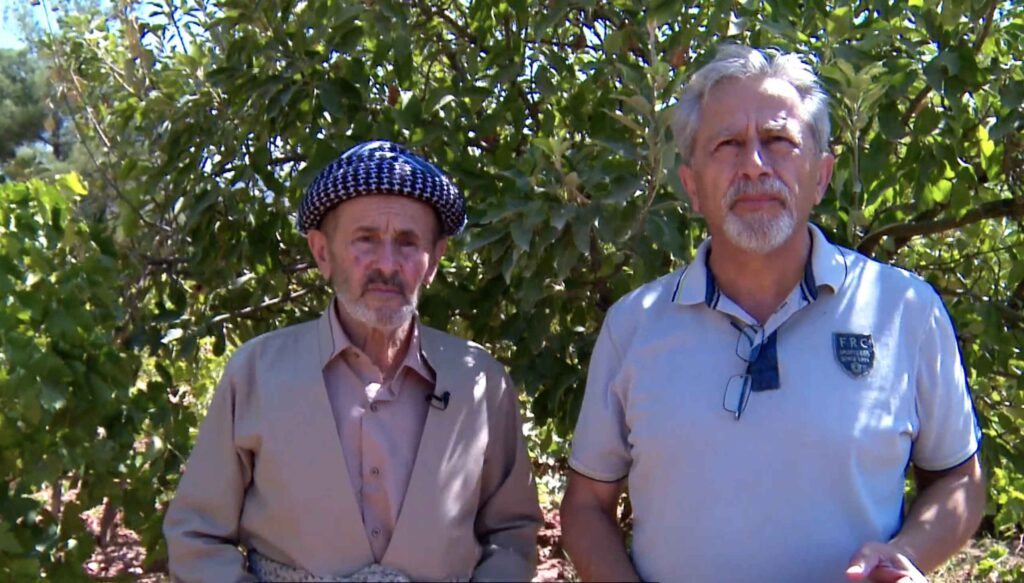Ibrahim Selman, filmmaker
İbrahim Salman is a versatile and prolific Kurdish artist, based in Amsterdam, who has been making films, as well as acting, directing, and writing plays, for nearly 50 years.
“I make films from the bottom of my heart,” the prolific artist told the NYKCC in a recent conversation. “I believe that although we will leave the world, our thoughts will stay.”
Biography
Ibrahim Selman was born in 1954 in the village of Zawite, near Duhok, in Başûr. In 1961, when he was seven, Iraqi Kurds led by Mustafa Barzani rose up against the regime of Abdul Karim Qasim. In response, Qasim ordered the Iraqi Air Force to indiscriminately bomb Kurdish villages. One of the villages bombed Zawite. Selman and his family fled to Baghdad. There in the city, Ibrahim’s father Selman Zawite told him, “Son, go and learn. So you can write about us later. Kurds have been through a lot. Tell that to the world.”
Ibrahim took it to heart. From 1972 to 1980, he worked as a programmer at the state broadcaster Baghdad Radio. He also got involved in theater and acting and in 1976 earned a degree in dramatic art and acting in Baghdad. In 1978 he created the short TV-film Think of an End to This Show: he was writer, director, and actor. In 1979 he wrote The Suffering of a Madman, a play that expresses his indignation about an occasion when Saddam Hussein visited Kurdistan: much to his outrage, Kurds danced for the dictator. In 1980 Selman staged it as solo performance.
In 1981 Selman left Başûr for the Netherlands, where he gained asylum. There he continued to write, direct, and act in films and plays, which expressed his love for Kurdistan. His monologue Between Two Paradises expressed the ambiguities of life in the diaspora: a man who fled a violent regime finds that his soul shrivels in a democratic country; he performed it from 1985 to 1987. In The Eternal Officer (performed 1988-89), two refugee couples waste their time by drinking tea and squabbling.

Other works publicized the occupation of Kurdistan, and the longstanding Kurdish resistance. He called attention to atrocities committed against Kurds, notably the bombing of Halabja with chemical weapons. In his 1991 film Three Profiles of a Mountain Man Who Wishes He Were a Seal, the protagonist is Ibo Kurdo, a Kurd living in the Netherlands who travels to Halabja, his hometown. There he finds the dead body of his daughter and goes insane. Meanwhile in the Netherlands, Ibo has two alter egos who try to do something to help the Kurdish victims. (All three alter egos are portrayed by Selman.) The film sought to break through the international indifference to and denial of genocide against Kurds. (Selman write, directed, and acted in this 38-minute film. You can watch it here.)

Starting in 1995 Selman directed about one hundred short films; a complete filmography is not available. Two feature-length films are available to watch and stand out.
A Silent Traveler (Karwanekê bêdeng) (1993)
A Silent Traveler, Selman’s debut feature film, was set in Başûr but filmed in Greece. All the actors were Kurdish and nonprofessionals. It was the first film in which the actors spoke only Kurdish. “The idea for this film was born in Kurdistan,” says the opening voiceover. “It became a screenplay in the Netherlands, and it was filmed in Greece to be viewed throughout the world and to show that wherever we are, our country, even if it has to live under soldiers’ boots, remains inviolate in our heart.” He dedicated the film to his father. Selman wrote and directed it; you can watch it here.
The film is set in a Kurdish mountain village, where Kurds chafe under the harsh rule of Saddam Hussein and his soldiers. Some villagers go to the nearby mountains to form a peshmerga force to resist. Silo, a Kurdish shepherd, is a leading figure in the village. One day while he and his son Simko are tending their flock, bored Iraqi soldiers kill a sheep. Silo buys a weapon in case he will need to defend himself: “Today it’s the sheep. Tomorrow, it’s us.” Simko is eager to take revenge and tries to join the peshmerga but is told to go home. Still, the family is divided: Silo’s nephew Moho has become a commander for the regime’s military. Moho’s superiors order him to search the family home for weapons, which he does reluctantly despite his feelings for them, especially for Silo’s intellectual daughter Kurde.

“Who makes Kurds into Peshmergas?” one character asks. “The authorities—they drive us to it,” comes the answer. Kurde joins the peshmerga, and Simko distributes a leaflet calling for a revolt. Peshmerga fighters then attack the police base. Iraqi soldiers try to deport two of the villagers, but Silo, the village leader, objects and leads one of the deportees away from the truck. Moho shoots him dead, in the back.
At Silo’s funeral, a mullah tries to read from Koran, but another mourner drowns him out with shouts of “Kurdistan is great!” “Silo lives—he was the heart of this village!” Later, in the mountains, while Simko herds sheep, he is accompanied by the ghost of his father. Silo is clearly still alive in spirit. At the end, Simko leaves the village.
Father and Son
The relationship between Simko and his father Silo has strong overtones of the relationship between Selman and his own father. In 1974, Selman’s father joined the peshmerga to fight in a second Barzani rebellion against the Iraqi military. The day his father left for the mountains, he invited Ibrahim, his eldest son, to join him, but Selman chose not go with him; he would serve his people in a different way. This Kurdish rebellion, like so many, was crushed, and in late 1974 Ibrahim’s father was killed in the fighting.
The Kurdish village where The Silent Traveler takes place is much like Zawite, where Selman grew up, and its residents too suffer under an Iraqi strongman. The peshmerga resist, both in the film and in real life. Silo, the father figure of the resistance in the film, is shot, as Selman’s father was killed in real life. And that father-figure embodies the spirit of resistance for his son Simko, as Selman’s father remains forever in Selman’s mind and heart. Simko in the film, like Selman in reality, leaves the village, carrying the spirit of his father with him.
If Selman’s life was a subtext for Silent Traveler, that connection became explicit almost three decades later in Letter to my Dad.
Letter to My Dad (2020)
Unlike Silent Traveler, Letter to My Dad (2020) is a documentary, in which director Selman documents his own journey back to Kurdistan. (Selman was producer, director, and editor, as well as central figure in the film. You can watch it here.) He revisits Zawite, then goes to look for his father’s grave, a half-century after his death. At the same time, in voice-over, he reads aloud a loving letter that he has written to his father. He “shows” his father around the places they used to know, like the old orchard and the village mosque. Then he “shows” him his life in Amsterdam, where he went to live in 1981 and “had to learn everything all over like a child.” “Dad, your heart was always on fire,” he tells him.

In his letter, he also talks about the present state of the Kurdish people. He talks about the disasters that have happened to his country—uprisings, revolutions, and crushed hopes. “The dream of an independent Kurdistan has become a nightmare,” he says. “But the Kurds never lose hope.”
But he confesses that he has come to a bitter conclusion: “Kurdistan will never become independent. Kurds will remain oppressed forever.” It gives him no joy to says this, as he also expresses his great love for Kurdistan. “Dad, I can’t help it, I am in love with this country,” he says. “I can’t stop my love, and I can’t burn my memories.”
Writings
In addition to being a filmmaker, actor, and director, Selman is an accomplished writer. He has published several novels, including En de Zee Spleet in Tweeën (And the Sea Split in Two, 2000), Ik Dacht aan Kokosnoot (I Thought of Coconut, 2002), Tedere Zielen (Tender Souls, 2006), and Laatste Vlam (Last Flame, 2010).
He has published two collections of poems: Dans van een Bevroren Land (Dance of a Frozen Land, 1998) and Vrijheid Is Dood (Freedom Is Dead, 2000). He published an autobiography, Dapper Hart Gezocht: Notities van een Gevluchte Iraakse Koerd (Brave Heart Wanted: Notes of a Refugee Iraqi Kurd (2007).
Over the years he has also written essays for the Dutch periodicals Trouw, NRC Handelsblad, and de Volkskrant. He has an appeared frequently on Dutch TV talking about Kurdish issues. Unfortunately is writings have not yet been translated into English.
For the NYKCC’s Kurdish Heritage Month 2024, Selman was interviewed by Kurdish Cinema Talks. Watch the video here.















